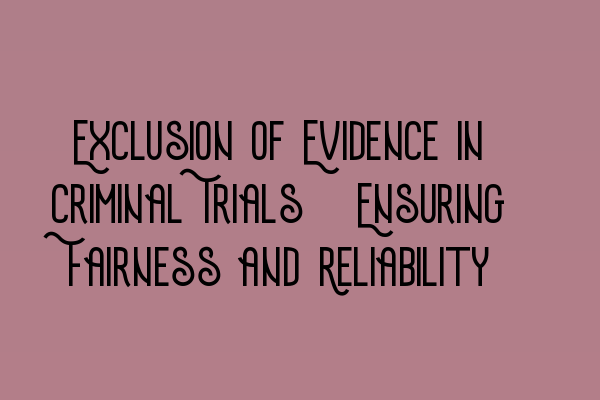Exclusion of Evidence in Criminal Trials: Ensuring Fairness and Reliability
Welcome to the SQE Criminal Law & Practice Law UK blog! In this post, we will explore the important topic of evidence exclusion in criminal trials and its significance in ensuring fairness and reliability in the criminal justice system. Understanding this aspect of criminal law is essential for aspiring solicitors and legal professionals. Before we dive into the details, be sure to check out our related articles on SQE 1 practice exam questions, SQE 1 practice mocks FLK1 FLK2, SQE 2 preparation courses, SQE 1 preparation courses, and SRA SQE exam dates.
The Importance of Evidence in Criminal Trials
When it comes to criminal trials, evidence plays a crucial role in determining the guilt or innocence of the accused. In order to arrive at a just and fair verdict, it is essential to evaluate the evidence presented by both the prosecution and the defense. However, not all evidence is admissible in court. The exclusion of certain types of evidence is based on legal principles and safeguards to ensure that the trial remains fair and reliable.
Grounds for Evidence Exclusion
There are several grounds on which evidence may be excluded from criminal trials. The most common grounds include:
- Relevance: Evidence that is not relevant to the case may be excluded. The court must determine whether the evidence is directly related to the facts in question and whether it has any probative value.
- Hearsay: Hearsay evidence, which is an out-of-court statement made by a person not testifying in court, is generally excluded. However, there are exceptions to this rule, such as when the statement falls within a recognized exception or is deemed necessary for justice to be served.
- Illegally Obtained Evidence: Evidence that has been obtained in violation of a person’s rights, such as through an unlawful search or seizure, may be excluded. The exclusionary rule aims to deter law enforcement from conducting illegal activities in the investigative process.
- Unfair Prejudice: Evidence that may unduly prejudice the jury or mislead them, such as evidence of a defendant’s character unrelated to the case, may be excluded. This ensures that judgments are based on the relevant facts of the case and not on emotions or bias.
- Privileged Communications: Certain communications, such as those between a solicitor and client, are protected by legal privilege. These communications are generally excluded from evidence to uphold the confidentiality and trust associated with the solicitor-client relationship.
The Role of the Judge
Ultimately, the admissibility of evidence and its exclusion falls under the discretion of the judge presiding over the criminal trial. The judge must carefully evaluate the evidence and apply the relevant laws and principles to ensure a fair trial. It is the judge’s responsibility to weigh the probative value of the evidence against any potential prejudice it may cause.
The Impact on Criminal Trials
The exclusion of evidence in criminal trials has a significant impact on the outcome of cases. It serves as a safeguard against unfairness, unreliability, and potential violations of individuals’ rights. By excluding evidence that does not meet the legal standards, the integrity of the criminal justice system is preserved and the accused is afforded due process.
It is important for aspiring solicitors and legal professionals to have a solid understanding of the rules and principles surrounding evidence exclusion. The SQE 1 practice exam questions and SQE 1 practice mocks FLK1 FLK2 articles linked above can be valuable resources to test and hone your knowledge in this area.
Conclusion
In conclusion, the exclusion of evidence in criminal trials is a critical aspect of the legal system. It ensures the fairness and reliability of trial outcomes by adhering to legal principles and safeguarding individuals’ rights. Aspiring solicitors must grasp the intricacies of evidence exclusion to navigate criminal trials successfully. If you’re preparing for the SQE exams, our SQE 2 preparation courses and SQE 1 preparation courses can provide you with comprehensive resources and guidance. Keep an eye on the SRA SQE exam dates to stay updated on upcoming exam sessions. Stay tuned to our blog for more insightful articles on criminal law and practice!
